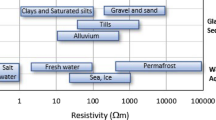Abstract
In this study, the electrical resistivity of soil having different chemical weathering index (CWI) was measured, and the correlation between CWI and the electrical resistivity was estimated. The electrical resistivity of soil varies with CWI of soil. The difference in the electrical resistivities of soils having different weathering degrees is clear at lower water contents. At the volumetric water contents estimated in this study, CWI could be described by a linear equation of electrical resistivity with the constants related to the volumetric water content. The findings in this study suggest that the electrical resistivity could be used as an effective alternative for estimating the weathering degree of soil.








Similar content being viewed by others
References
Abu-Hassanein ZS, Benson CH, Blotz LR (1996) Electrical resistivity of compacted clays. J Geotech Eng 122:397–406
Arulanandan K, Muraleetharan K (1988) Level ground soil-liquefaction analysis using in-situ properties:1. J Geotech Eng 114(7):753–770
Iliew IG (1966) An attempt to estimate the degree of weathering of intrusive rocks from their physico-mechanical properties. Proceeding 1st congress international society of rock mechanics, vol 1, Lisbon, pp 109–114
Irfan TY, Dearman WR (1978) Engineering classification and index properties of weathered granite. Bull Inst Assoc Eng Geol 17:79–90
Keller GV, Frischknecht FC (1966) Electrical methods in geophysical prospecting. Pergamon Press, Oxford
Lee JK, Chang SM (2003) Evaluation of weathering intensity and strength parameter for weathered granite masses (I). J Korean Geotech Soc 19(2):227–236
Lee SG, Freitas MH (1988) Quantitative definition of highly weathered granite using the slake durability test. Geotechnique 38(4):635–640
Lumb P (1962) The properties of decomposed granite. Geotechnique 12(3):226–243
Mendes FM, Barros LA, Rodrigus FP (1966) The use of modal analysis in mechanical classification of rock masses. Proceeding of 1st congress international society of rock mechanics, vol 1, Lisbon, pp 217–223
Murata H, Hyodo M, Yasufuku N (1987) Compressive and shear characteristic of undisturbed decomposed granite soils paying attention to the degree of weathering. Proc JSCE 382(III-7):131–140
Oh M, Kim Y, Park J (2007) Factors affecting the complex permittivity spectrum of soil at a low frequency range of 1 kHz–10 MHz. Environ Geol 51:821–833
Park BK, Lee KC (1999) Evaluation methods of weathering degree for Korean decomposed granite soils. J Korean Geotech Soc 15(1):127–140
Parkhomenko E (1967) Electrical properties of rocks. Keller GV (ed) Plenum Press, New York
Purvance DT, Andricevic R (2000) On the electrical-hydraulic conductivity correlation in aquifers. Water Resour Res 36(10):2905–2913
Rinaldi VA, Cuestas GA (2002) Ohmic conductivity of a compacted silty clay. J Geotech Geoenviron Eng 128(10):824–835
Santamarina JC, Klein KA, Fam MA (2001) Soils and waves. Wiley, New York
Sueoka T (1988) Identification and classification of granite residual soils using chemical weathering index. Symposium on the weathering residual soil, pp 89–94
Thevanayagam S (1993) Electrical response of two-phase soil: theory and applications. J Geotech Eng 119(8):1250–1275
Ward S (1990) Resistivity and induced-polarization methods. Geotech Environ Geophys 1:147–190
Yoon GL, Park JB (2001) Sensitivity of leachate and fine contents on electrical resistivity variations of sandy soil. J Hazard Mater B84:147–161
Author information
Authors and Affiliations
Corresponding author
Rights and permissions
About this article
Cite this article
Son, Y., Oh, M. & Lee, S. Estimation of soil weathering degree using electrical resistivity. Environ Earth Sci 59, 1319–1326 (2010). https://doi.org/10.1007/s12665-009-0119-0
Received:
Accepted:
Published:
Issue Date:
DOI: https://doi.org/10.1007/s12665-009-0119-0




